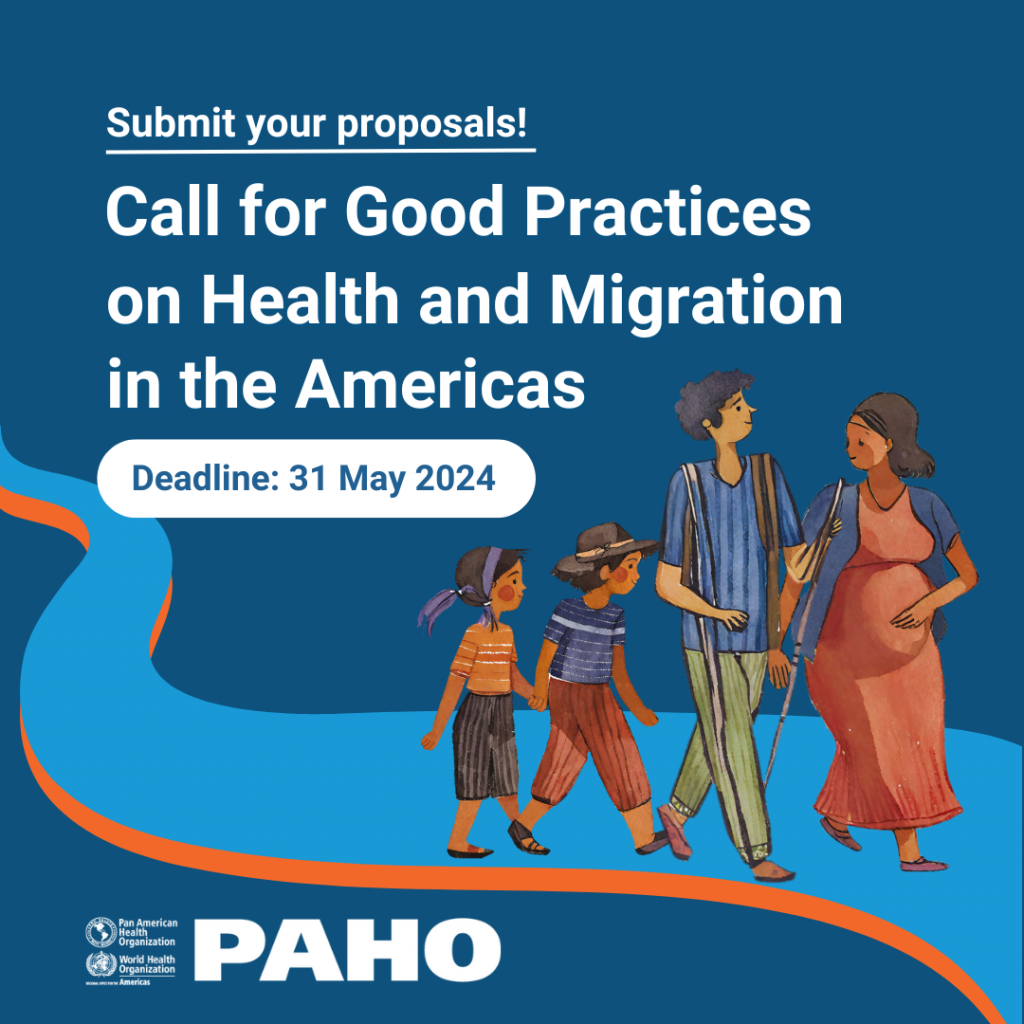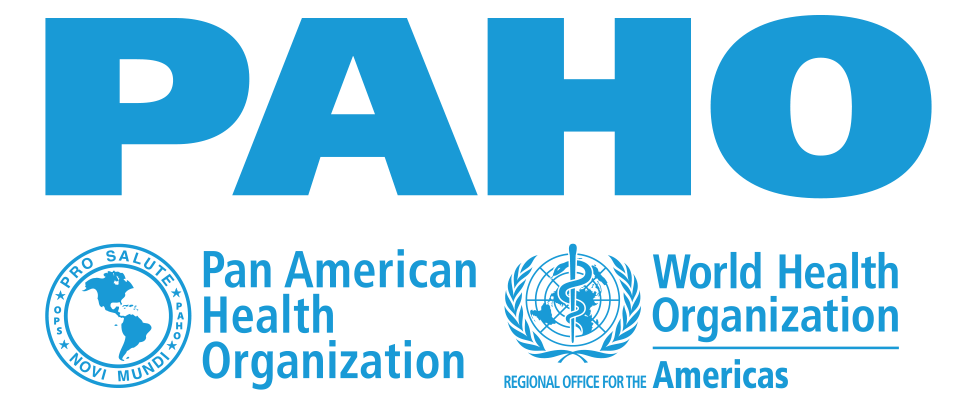[CLOSED] Deadline extension: Migration and Health in the Americas

The Pan American Health Organization (PAHO) through the Departments of Health Systems and Services (HSS), Health Emergencies (PHE), and Social and Environmental Determinants for Health Equity (DHE), in coordination with the Department of Evidence and Intelligence for Action in Health (EIH), invites all national and international actors to participate in the Call for Good Practices in Migration and Health in the Americas.
The goal is to bring together good practices in the Region of the Americas to strengthen actions aimed at protecting the right to health of migrants and ensure equitable access to quality health services. This Call also aims to promote the exchange of knowledge of diverse interventions that address the needs of migrants and serve as a guide for the search of short-, medium- and long-term solutions in diverse geographic areas and contexts.
Background
The dynamic intra- and extra-regional population movement in the Americas, migration continues to be a priority topic on the agendas and in policy discussions of many countries in the Region. Migration flows mostly comprise of people heading toward North America, primarily from Guatemala, Ecuador, Honduras, and Mexico. According to the International Organization for Migration (IOM), the border between Mexico and the United States is the largest migration corridor in the world. The displacement of Venezuelan citizens in recent years has also continued to rise and is now considered the second largest displacement event worldwide, with over 7.7 million refugees and migrants— over 6.5 million of them have resettled within the Americas, mainly fleeing to neighboring countries. People on the move from Venezuela as well as the Caribbean, notably Haiti and Cuba, have also gone to various countries in South America. Of particular concern is the high number of children and adolescents on the move, often times making the journey on their own, the Americas alone, hosts approximately 26 per cent of all international migrants.
Whether people decide to migrate for economic reasons or because they are forced to do so, millions of them regularly face a multitude of challenges at every stage of the migratory process – departure, transit, arrival, and return. They are often exposed to an array of factors that jeopardize their physical and mental health including trafficking, kidnap, sexual and other violence, theft, and the need to travel through perilous natural terrain, among other factors that also lead to many dying in route. In addition, along the migratory process, migrants are frequently left with no, or limited, access to primary health care, medicine, vaccines, and emergency health services. As such, the health needs of migrants are often neglected, especially in maternal and child health, emergency care, prevention and control of communicable and non-communicable diseases, sexual and reproductive health, and mental health and psychosocial support.
In addition, many migrants (especially undocumented) are precariously integrated into destination countries, especially in terms of the entering the labor market and places of residence. Consequently, migrants tend to be placed into lower quality jobs in which they are vulnerable to confronting forced labor, without the right to social protection and health coverage. They are also more exposed to working conditions that are detrimental to their physical and mental health. At the time of arrival, most migrants in situations of vulnerability, often including temporary migrant workers, tend to live in informal settlements and marginalized neighborhoods. In these areas, migrants are more exposed to violence, poor water and sanitation, traffic accidents, and natural disasters such as floods or landslides, among other harmful conditions.
The multitude of legal, economic, socio-cultural, and other barriers to accessing essential health services and other social services, such as those providing food and nutrition, housing, etc., increases already existing inequities in the Region. This leaves migrants in compounded situations of vulnerability. To address the issue, and in line with commitments made by Member States on achieving Universal Access to Health and Universal Health Coverage, it is imperative to provide access to comprehensive, efficient, and quality health services for the migrant population (including refugees, asylum-seekers, internally displaced people, seasonal workers, and irregular or regular migrants), in addition to host populations. As a result, Member States have made further regional and international commitments through several frameworks including, among others, the adoption of the WHO Global Plan on the Promotion of Refugee and Migrant Health (renewed, 2023-2030) and the development of the 2019 PAHO Guidance Document on Health and Migration which provides five strategic lines of actions on which this call for good practices is based.
While many actors from policymakers to civil society organizations have moved forward to address the health needs of migrants, there remains much to be done that requires robust intersectoral collaboration and coordination in topic areas that need to be highlighted in addressing underlying causes of migrant health issues.
Successful examples related to migration and health should be recognized and capitalized on to facilitate the implementation of effective action more broadly in the Region. This call will foster knowledge-sharing on lessons learned and good examples, acting as a catalyst for replicating similar short-, medium-, and long-term solutions in other contexts throughout the Region.
Published Good Practices
The dissemination of the approved Good Practices is envisaged for July 2024.
This Call is CLOSED for submissions
Participants:
- National Authorities (public health insititutions and other related sectors)
- Academic institutions
- Civil society organizations
- Non-governmental organizations
- Media agencies
- Research institutions
- Experts (professionals, policymakers, researchers)
Languages:
- English
- Spanish
- Portuguese
Submission deadline:
31 May 2024 (extended)
Additional Information Regarding this Call
Supporting Materials of the Call
You may also find interesting:
- Department of Health Systems and Services
- Department of Health Emergencies
- Department of Social and Environmental Determinants for Health Equity
- Department of Evidence and Intelligence for Action in Health
Technical Review Committee
A recognition is extended to the following members of the Technical Review Committee for this Call for Good Practices who will carry the technical assessment of the proposals received:
| Name | Affiliation | Country |
|---|---|---|
| Celso Bambaren | Pan American Health Organization | |
| Ietza Bojórquez | Colegio de la Frontera Norte* | Mexico |
| Andrea Cortinois | University of Toronto; Dalla Lana School of Public Health* | Canada |
| Anaclaudia Gastal Fassa | Pan American Health Organization | |
| Natalia Houghton | Pan American Health Organization | |
| Julie Issa | Pan American Health Organization | |
| Fabrizio Mendez | Pan American Health Organization | |
| Alexandra Obach | Universidad del Desarrollo* | Chile |
| Orielle Solar | Pan American Health Organization | |
| * Acting on an individual capacity |
Conflicts of Interest
Technical Review Commitee
None to disclose.
Funding sources
PAHO/WHO.
